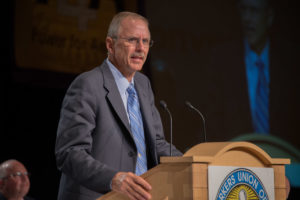As you read this, final preparations are being made for our third Power for America National Conference. The event brings together several hundred UWUA members in a clear example of our union’s commitment to continuous learning for union officers, stewards and rank-and-file members.

By offering learning opportunities — not just for new members coming into the workforce but for everyone — we provide the tools our members need to handle every workplace situation.
The P4A conference includes industry break out sessions that bring together union brothers and sisters from around the nation who work in the same industry — electric, gas, water, professional/technical, and call center/clerical — with experts to discuss trends and learn from each other.
The 15 interactive workshops cover everything from nuts and bolts union topics, such as contract negotiations, contract costing, and grievance handling, to other important issues ranging from right-to-work, to safety, and toxic exposures.
Nationally recognized experts will participate in plenaries and workshops covering diversity and inclusion, strategic communications, human resource development, and more.
Equally important is the bringing together of our members to share information, build relationships, and celebrate what we do day-in and day-out for our communities and our country.
Realizing the vision
The P4A Training Trust is on track to train more than 5,000 members this year, with even more in the pipeline. This is a remarkable achievement, given that P4A is relatively young. It was set up following the passage of the “Training to be the Best” resolution at our 28th National Convention in 2007.
We saw then what our experience now proves: to continue to be the safest, most productive, highest skilled workers in the world we needed to take on the responsibility of training the utility worker of the future.
At first, P4A was providing the resources, such as tuition and books, for others to do training. We quickly learned that this was not providing the results that we, and our participating employers, wanted.
We then took it upon ourselves to provide the hands-on-training and demonstrated that we could do it better, and more economically, than anyone else. In hindsight, it’s really a no brainer. Who better to train utility workers than utility workers themselves?
Since then, P4A leased a building in Potterville, Michigan with classrooms and space for hands-on training. We quickly ran out of room and added an addition to accommodate various training programs. We are also now doing hands-on and classroom training in Chicago and New York.
As P4A continues to grow, we will expand our training centers to different parts of the country and to involve more employers. All of this started with just one employer just a few short years ago.
Shortage of skilled workers
By assuming the role of providing training for our members, future members, and employers, we are filling the void created when investment in training dried up all across the country. There is widespread recognition now that the shortage of skilled labor is hurting our country. This is a real problem that is holding back progress everywhere.
We have proven that we have the answer. We are the ones who can train the new workforce. This is not a new role for the Utility Workers and other labor unions. Skilled labor is about having hands-on training where you can learn from someone who has done the work.
If you look back at history, unions, particularly those in the building trades, created the skilled workforce. Employers did not do that.
Not coincidentally, it was organized labor that also built the middle class.
As investment in training declined, the number of skilled workers declined. Combine that with the corporate attack on labor over the last 50 years and it’s no wonder that the middle class has taken a real beating.
And so has the nation. Employers now realize the importance of training in building their companies. Businesses are attracted to areas that have the utility infrastructure to support them. A better trained workforce is good for business. It’s that simple.
And no one is better at training than we are. P4A is proving that every day.

